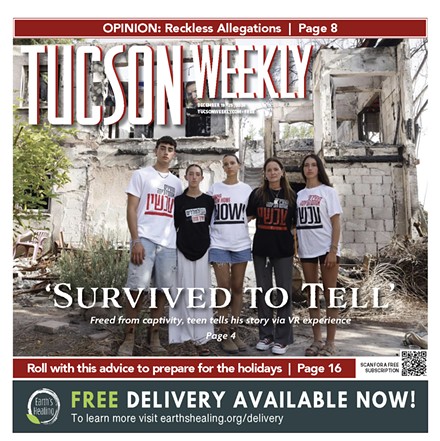On his new book, Why Walls Won't Work: Repairing the US-Mexico Divide, Michael Dear, a professor of city and regional planning at the University of California, Berkeley, writes that people have a tendency to think of the borders between countries as being so substantial and enduring as to almost be natural geographical features. However, he tells us, such lines of demarcation are not nearly as real and unalterable as we may think they are.
Dear says international boundaries are actually little more than arbitrary constructs existing primarily on maps and in the human imagination, vaporous notions that shift and dissolve according to the vagaries of geopolitics. Imagining a world devoid of borders, he says, would free our perceptions from "edges, political boundaries, and nationalistic taint," and we would become "sensitized to a more universal human connectivity."
In December 2002, funded by a grant from the National Geographic Society, Dear began an exploratory trek along one such arbitrary construct, the 2,000-mile-long U.S.-Mexico border. Traveling from the Pacific Ocean to the twin cities of Brownsville, Texas, and Matamoros, Mexico, Dear finished his odyssey in the spring of 2004. During that time, he was a witness to the beginning stages of the massive border security buildup that followed Sept. 11, In the years since, he has frequently revisited the region, watching with dismay as the United States has continued to add layer upon layer of security infrastructure.
Dear believes that current U.S. border policy, especially the hundreds of miles of wall that stretch intermittently along the partition, has had a decidedly detrimental impact on the borderlands, turning the area into a "mean place" that engenders an "atmosphere of mistrust ... fear and hostility." He says that drug-related violence and undocumented immigration have also created serious tensions along the line. But while he admits to having no magical solutions, he's convinced that the border wall will ultimately prove to be a flawed remedy to the difficulties besetting the region.
The major focus of this engaging and multifaceted book is not on the border wall—or even U.S. border policy in general—but rather on the vast, multicultural territory that the border bisects. Calling the region a "third nation," Dear takes readers on an illuminating exploration of its history and personality.
According to Dear, the third nation is an "in-between" place of interwoven cultures and ethnicities "carved out of the territories between two existing nation-states," functioning as a kind of "connective membrane" between them. Dear writes that while this area, with its chain of binational cities and towns and thriving cross-border economy (the northward flow of drugs and the southward flow of guns being a "perverse kind of transborder integration") is deeply connected materially, it is the cognitive cohesiveness of its residents that makes the region a true third nation.
"No matter what we call this shared space," he says, "certain features of the cross-border community stand out: border people are different from others in their respective nations, they are self-conscious about living in the spaces between two nations, and they understand that a shared identity is produced through interaction across the line."
Dear says that the principal reason why the border wall won't work is because of this vibrant, deeply rooted sense of connectivity that the "partition cannot compromise." The wall will eventually come down, he declares, because walls based on such dubious, geopolitical divisions are always fated to fall.
Dear acknowledges that the fence has reduced crime in certain areas along the border, but he writes passionately about the disruptive effects it has had on the region. He also examines the plight of undocumented immigrants caught up in the U.S. legal system; the bigoted antics of Maricopa County Sheriff Joe Arpaio and former Arizona state senator Russell Pearce; and the horrifically violent Mexican drug cartels, whose continued existence, he says, like that of the U.S. "Border Industrial Complex," is fostered in part by a complex array of vested interests on both sides of the border.
Dear tells us that the third nation is a resilient land. Pointing to the unflagging sense of unity existing between border communities such as San Diego-Tijuana and Brownsville-Matamoros, the slowly improving fortunes of Ciudad Juárez, and the personal stories of numerous border residents who continue to live cross-border lives, Dear writes that, despite enormous upheavals, border communities have made remarkable adjustments and "the third nation endures."
"The miracle," he says, "is how much civility still lingers along the line."






